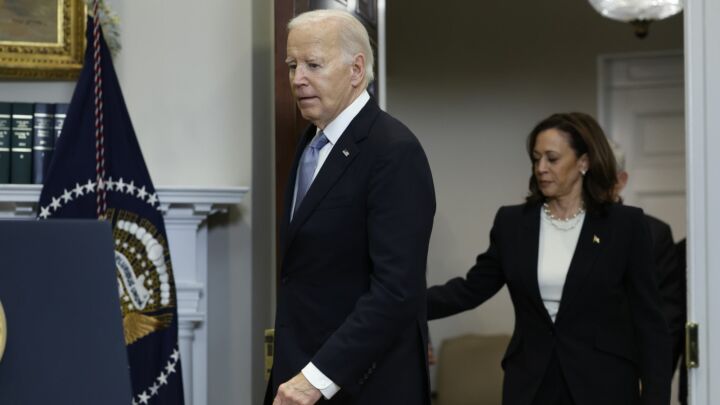We need to decriminalise abortion once and for all
There should be no limit on a woman's right to choose.

In June, Carla Foster was given a 28-month prison sentence for illegally obtaining abortion pills and terminating a seven-month pregnancy. Two weeks ago, the Court of Appeal suspended her sentence, letting her walk free from prison. Yet, in the same week that Foster was set free, another British woman, Bethany Cox, appeared in the dock in Teesside, accused of a similar offence.
In July 2020, Cox aborted her pregnancy. She had gone beyond the 24-week cut-off for legal abortions. She has now been charged with ‘child destruction’ by means of bringing about her own miscarriage, under Section 58 of the Offences Against the Person Act 1861. She is due to be sentenced in two weeks’ time.
The cases of Foster and Cox shine a much-needed spotlight on Britain’s abortion laws. Unlike in the US, abortion in the UK has been seen for many years as largely a medical issue. This has kept abortion safe and legal in most instances. But it has also meant that we have sidestepped the debate we need to have over fully decriminalising abortion in the UK. It is time we started to ask serious questions about whether the current limit of 24 weeks meets the needs of women, their doctors and society.
The law as it stands fails to recognise how the experiences of abortion and pregnancy have changed for women in recent decades. After all, the law that has criminalised Foster and Cox is a product of the 19th century. It was designed to create a framework that established the value of pregnancy at a time when birth control was largely a matter of ‘bringing on menses’ (inducing a period). The Abortion Act 1967, which introduced legal abortion within a certain time limit, sought to regulate when and how abortion could be carried out. It provided a legal framework in which abortion was still considered outside the norm but was allowable if doctors approved and provided it in a safe clinical environment. This law also reflected the values of the time.
The full decriminalisation of early abortion ought to be uncontroversial today. Since the 1960s, everything about early abortion has changed. It is technically far easier than ever before. Moreover, abortion is less stigmatised in Britain than ever before. So the law needs to catch up. It needs to reflect the fact that early abortion is no longer risky or socially unacceptable.
Ironically, although the Abortion Act 1967 was designed to facilitate safe abortion, there are elements of this law that now obstruct it. Not only does the law criminalise late-term abortions, it also places unnecessary hurdles on abortion pills in early pregnancy.
The use of abortion pills in early pregnancy needs no law to make it safe, beyond those that apply to other medicines. Since the Covid-19 lockdown, the introduction of access to abortion pills by post on the NHS, following an online consultation, has shown how easy it can be for women to manage an early abortion in their own home.
From the perspective of officials and doctors, however, the provision of abortion pills by post is fraught with potential problems. Doctors are required to certify how far along a pregnancy is, but when no physical evidence is available they must rely on information the woman provides. In practice, this shifts responsibility for the abortion to the woman, which is exactly where it should be. But the law still requires that doctors regulate pills by post as if they were prescribing them in person. They can pretend to do this, but it’s a charade. Women know what they need to say in order for the pills to be sent.
Later abortions pose a different set of problems. They need clinical supervision and support to be safe. Criminalising late-term abortions has led some women to procure them without medical supervision, which puts them at unnecessary risk. There will always be a desperate few willing to take desperate measures. In 2020, when Carla Foster took abortion medication, she effectively induced a stillbirth. And she did so alone in her bathroom.
Often, from the perspective of political activists, an abortion is an abortion. If you’re pro-choice, a woman’s body is her own and so is the right to decide about the future of her pregnancy. If you’re against abortion, the life of the unborn child is paramount and as important as the life of the born, at whatever stage of the pregnancy. However, most women don’t tend to see their own pregnancies in such black and white terms. They tend to want to access abortion as early as possible. It’s not unusual to hear a patient say, ‘I want an abortion but only if it’s under 10 weeks or 12 weeks’. Sometimes that timeline is stretched because she finds she is further along than she thought, and yet she still feels compelled to act. And that is also true for pregnancies beyond the current legal limit.
When I was running the British Pregnancy Advisory Service, the women we had to turn away were often only a week or so over the 24-week legal limit. Some didn’t realise how advanced their pregnancy was, and many more simply couldn’t get an appointment in time.
The 24-week limit was set as a measure of fetal viability. The idea is that after this point a baby could be born alive. And yes, some babies can be born at this stage in a few specialist hospitals. But there is still no reason why 24 weeks should have any particular moral significance. It is ultimately arbitrary.
We need to think seriously about an abortion law without a legal time limit. The idea only seems strange to us in England because we’re so used to there being a time limit. In Scotland, for bizarre and complicated reasons, there was no time limit until 1990, even though the 1967 act was UK-wide. And yet, abortions weren’t taking place later than in the rest of Britain. In Washington, DC, there is also no time limit. A late abortion doctor who cares for women from across the US and abroad told me he provides the service because women who seek abortion at that stage are truly desperate, and he wants them ‘to be safe’.
It seems to me that we need to leave the decisions about late abortions to women and their doctors. Yes, it is easy for some to say that abortion at 30 weeks is wrong. But is it truly impossible to think of the circumstances in which it may be right? After all, no woman sees late abortion as simply an extension of birth control. As one writer opposed to abortion put it, a woman ‘wants [a late] abortion as an animal, caught in a trap, wants to gnaw off its own leg’.
Some commentators say the UK’s current legal framework is a good compromise. That may once have been the case, but it’s not true anymore. Society and medical technology have moved on. We need to accept that it is always the woman herself who is best placed to make a moral decision about her pregnancy. We should be making it as easy as possible for a woman to act in accordance with her conscience – in accordance with her view of what is right for her and her family. Where clinical intervention is required, our laws and regulations should be designed to make it as safe as any other medical procedure.
No woman should be prohibited by law from exercising her moral judgement about her pregnancy. No doctor should be prohibited from applying her skills when she feels it is right. If we adopted that framework, no woman would feel the need to lie to get medication. And no woman would conceal her pregnancy and try to miscarry alone in her bathroom.
Ann Furedi is author of The Moral Case for Abortion: A Defence of Reproductive Choice.
Picture by: Getty.
To enquire about republishing spiked’s content, a right to reply or to request a correction, please contact the managing editor, Viv Regan.








Comments
Want to join the conversation?
Only spiked supporters and patrons, who donate regularly to us, can comment on our articles.